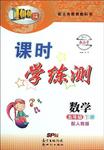题目内容
Do you know who invented tea? In fact, tea, the most popular drink in the world (after water), was invented by accident (偶然). According to an ancient Chinese legend (传说), the emperor Shen Nong 1 tea when he was boiling drinking water over an open fire. Some leaves from a nearby bush (灌木丛) fell into the water and remained there for 2 . The emperor noticed that the leaves in the water produced a 3 smell. Later he decided 4 the hot mixture (混合物). It was quite delicious. And 5 , one of the world’s favorite drinks was invented.
China is the home of tea, 6 has more than 4,000 years history. People throughout China drink tea daily. 7 the three major drinks—tea, coffee and cocoa, tea is drunk by 8 people in the world. Tea from China, along 9 silk and porcelain, began to be known by the world over a thousand years ago and has been an important Chinese export 10 .
Tea leaves 11 mainly in the area south of the Yangtze River, in the provinces of Zhejiang, Jiangxi and Fujian, because of the mild 12 and rich soil there. Longjing, Wulong, Pu’er and Tieguanyin are all 13 kinds of tea.
Over the past centuries, Chinese people 14 their unique tea culture, which includes tea planting, tea-leaf picking, tea making and so on. Tea is 15 a popular topic which is often mentioned in dances, songs, poems and novels.
1. A. invented B. found out C. discovered D. tried out
2. A. sometimes B. some time C. some times D. some days
3. A. pleasant B. pleased C. bad D. terrible
4. A. not to taste B. to taste C. tasting D. taste
5. A. by the way B. on the way C. on its way D. in this way
6. A. who B. which C. where D. when
7. A. In B. For C. Of D. By
8. A. the number of B. a number of C. a large number of D. the largest number of
9. A. between B. with C. except D. besides
10. A. At that time B. from now on C. since then D. since now
11. A. produce B. are produced C. make D. are made
12. A. climate B. weather C. condition D. environment
13. A. interesting B. important C. famous D. normal
14. A. had developed B. have developed C. developed D. are developing
15. A. too B. as well C. either D. also
1—5CBABD 6—10 BCDBC 11—15 BACBD

 百年学典课时学练测系列答案
百年学典课时学练测系列答案Long, long ago there was a very foolish thief. Do you know what he did one day? When he wanted to steal (偷) the bell on his neighbor’s door, he walked up to the door, took hold of (抓住) the bell and pulled hard. The bell made a very loud noise. The thief was afraid and went home.
Then he sat down to think, “I must do something about the noise,” he said. He thought and thought. At last he had an idea. “Ah, I’ll put some cotton in my ears. Then I won’t be able to hear the noise.” The next day he went to the door of his neighbor, and took hold of the bell. This time he pulled even harder. The bell rang loudly, but the thief did not hear anything. With another hard pull he got the bell out. Just then the neighbor came running out. “Steal my bell? I’ll teach you a lesson (教训),”the angry man shouted. And he hit the thief on the nose.
The foolish thief did not know how the neighbor found out he was stealing the bell. “Why did he come out just then?” he wondered (感到疑惑).
【小题1】The thief was trying to get .
| A.his neighbor | B.his neighbor’s doorbell |
| C.some cotton | D.a door with a bell on it |
| A.safe | B.difficult | C.dangerous | D.easy |
| A.he knew his doorbell was being stolen |
| B.he thought someone was eager (渴望的) to visit him |
| C.He realized (意识到) something strange happened |
| D.Both B and C |
| A.give him lessons | B.punish (惩罚) him for stealing |
| C.help him with the bell | D.be his teacher |
| A.The thief understood why he was hit on the nose. |
| B.The thief knew why the neighbor came out. |
| C.The thief thought the neighbor could not hear the bell. |
| D.The thief didn’t want to know why the neighbor ran out just at the time he stole the doorbell. |